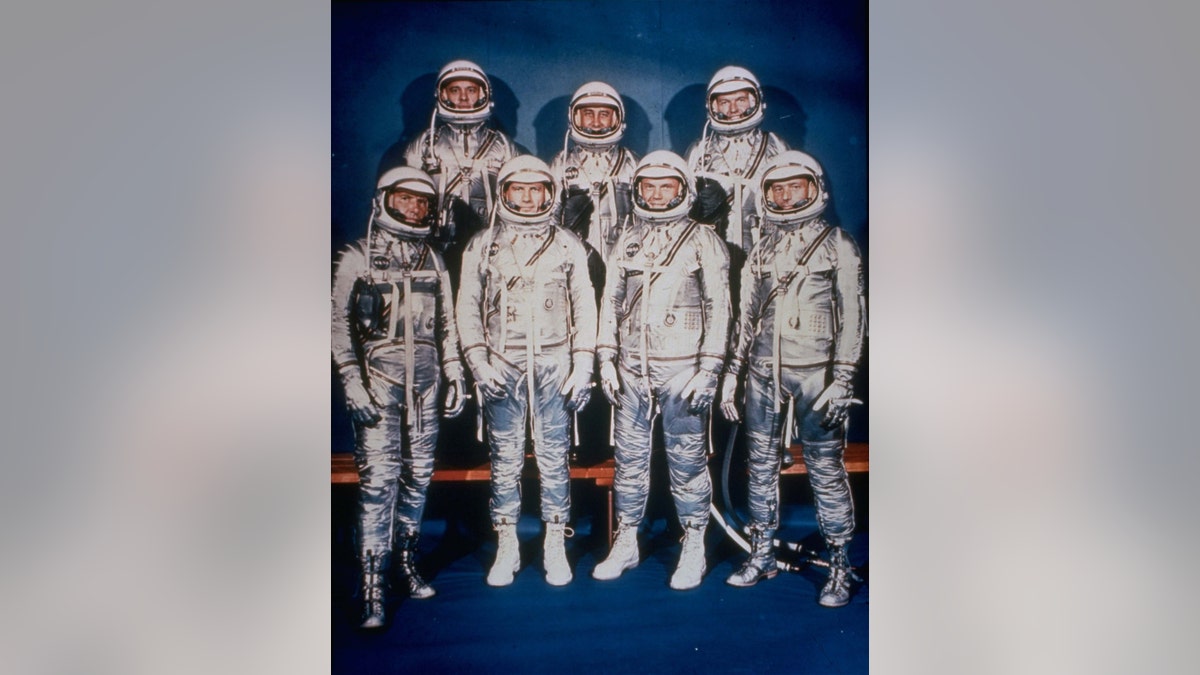
This 1961 file photo provided by NASA shows the original seven Mercury astronauts in their silver spacesuits. First row, from left are Walter Schirra Jr., Donald Slayton, John Glenn and Scott Carpenter. In the back row are Alan Shepard, Jr., Virgil Grissom and Gordon Cooper. (AP1961)
COLUMBUS, Ohio – Exactly fifty years after he became the first U.S. astronaut to orbit the Earth, John Glenn chatted Monday with two Americans aboard the International Space Station, a situation beyond imagining when he squashed himself into a tiny capsule, rocketed skyward and circled the globe for nearly five hours.
Glenn's mission -- dangerous, untested and breathtaking -- restored America's place in what was then known as the "space race" with the Soviet Union and made Glenn, an ex-Marine pilot, an instant national hero honored with a ticker-tape parade.
In the words of author Tom Wolfe, he had "the right stuff."
Now 90, but still with a strong voice and sturdy frame, Glenn celebrated the anniversary at Ohio State University with the ISS conversation and a celebratory dinner scheduled for Monday night.
[pullquote]
He asked the astronauts about technical matters, such as plant growth studies onboard, and marveled that he was watching them on "high definition television and you are coming through perfectly" in contrast to the technical transmissions during his own flight.
Glenn's career, both in and out of space, didn't end with his achievement on Feb. 20, 1962, when he piloted the "Friendship 7" spacecraft on a three-orbit mission more than 100 miles from Earth that lasted four hours, 55 minutes and 23 seconds.
He went on to become a U.S. Democratic Senator from Ohio from 1975-99 and at 77, when he was about to end his political career, Glenn became the oldest person ever to fly in space when he lifted off on the space shuttle Discovery.
But it was his historic orbital mission half a century ago that garnered all the recent attention, including a dinner last weekend with approximately 125 surviving veterans of NASA's Project Mercury at Kennedy Space Center in Florida.
Glenn appeared with 86-year-old Scott Carpenter, the only other survivor of the original Mercury 7 astronauts and the voice who famously intoned "Godspeed, John Glenn" at takeoff.
"We may be up on the point of that thing and get a lot of the attention, and we had ticker-tape parades and all that sort of thing. But the people who made it work ... you're the ones who deserve the accolade," Glenn told the NASA veterans.
The mission by the Ohio native known for his small-town decency and calm heroics restored America's pride in its space program after the Soviets seemed to take the lead by launching the first spacecraft and the first human into space on a one-circle orbit.
Then-President John F. Kennedy, who had publicly proclaimed in 1961 the goal of an American on the moon by the decade's end, called Glenn "the kind of American of whom we are most proud."
And when Americans landed on the moon on July 20, 1969, John Glenn had been instrumental in paving their way.








































